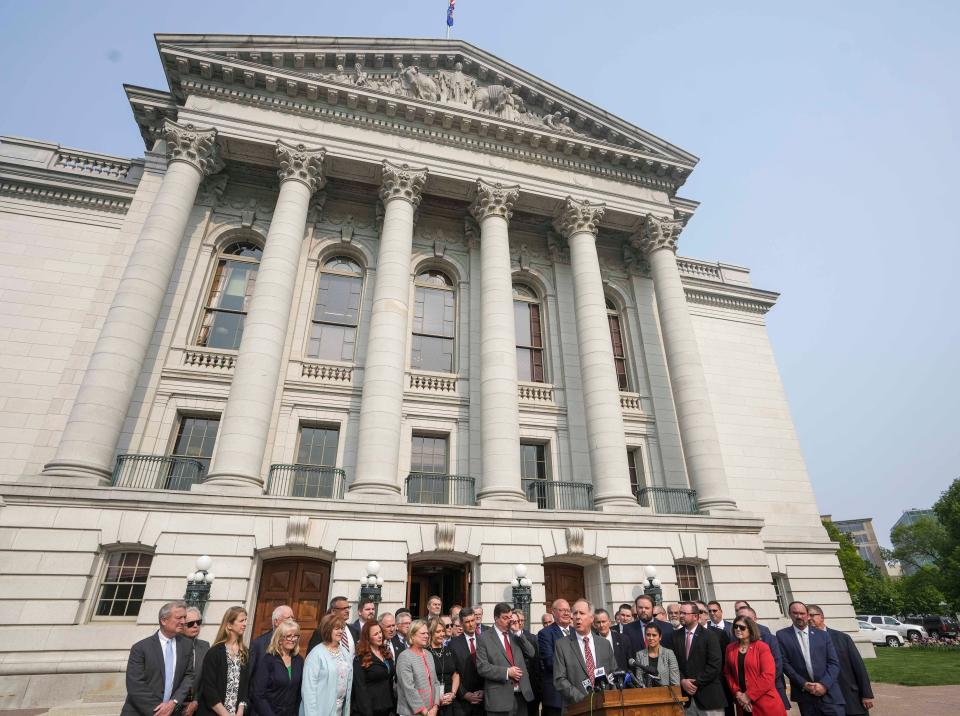Ratings agency downgrades Milwaukee's credit, citing the looming fiscal cliff and talks with state legislators
Uncertainty over Milwaukee's deteriorating finances and negotiations on state legislation to head off the city's looming fiscal cliff figured prominently in a report this week explaining a decision to downgrade the city's bond rating.
The decision from Fitch Ratings reflects the city's fiscal challenges — namely stagnant or capped revenue sources and rising costs, including a spike in its annual pension contribution — but also the rating agency's doubts about whether the state legislation will be enough to help the city balance its budget and avoid significant cuts to public safety.

"It’s really another source of outside confirmation that when city leaders say they are facing tremendous financial challenges that that is indeed the case," said Rob Henken, president of the nonpartisan Wisconsin Policy Forum that has long produced in-depth analyses of the city's finances and warned of its increasingly dire fiscal state.
The sweeping legislation passed by the Assembly and now before the Senate would allow the City of Milwaukee to levy a 2% sales tax while Milwaukee County could add a 0.375% sales tax on top of its current 0.5% tax, if voters approve. It would also boost the amount of shared revenue that returns to the city and county from the state while imposing a series of policy changes.
Fitch's decision to downgrade the city's bond rating means it will cost more for the city to borrow, though the Comptroller's Office did not know Wednesday exactly how much more.
Although the city's downgraded bond rating from Fitch remains "investment grade," the two-notch downgrade from A to BBB+ has caused concern at City Hall. And, it came even as another rating agency, S&P Global, opted against changing its own rating for Milwaukee, city officials said.
"We're concerned ... and we're definitely shocked," Milwaukee Comptroller Aycha Sawa said. "We were not expecting a two-notch downgrade."
Joshua Benson, the city's capital finance manager, said Fitch took a more pessimistic view of how the state legislation will unfold than S&P Global.
"I think that S&P, rightfully so, placed more weight on the positive momentum that we’re seeing the past several weeks for the city's finances going forward, specifically the ... headway we appear to be making with the state legislation," he said.
Milwaukee-area leaders have long pushed state leaders for increased shared revenue and the ability to raise additional revenue via a local sales tax.
Milwaukee leaders have expressed optimism at how far local and state leaders have come this year in formulating legislation to help address serious fiscal challenges that have developed in communities across Wisconsin because of how the state funds local governments.
Budget Director Nik Kovac called the negotiations so far "remarkably successful" and said both of the funding mechanisms in the legislation are expected to rise with inflation, allowing the city to maintain services "near or above current levels."
"This is a generational opportunity for the City and State to collaborate in a way that will benefit the residents of our state’s biggest city, and we are optimistic that our leaders will get it done," he said in a statement. "Our expectation is that once these new revenue sources are secured, our bond ratings will return to prior levels."
In the City of Milwaukee, the state has returned a stagnant amount of shared revenue to the city for more than two decades and limits local governments' ability to raise revenue through other means such as sales taxes or by raising property taxes. At the same time, the city's annual pension contribution is spiking while other costs are rising and reserves are dwindling, including the nearly $400 million Milwaukee received in federal pandemic aid.
City leaders warn of a "fiscal cliff" in 2025 if nothing changes.
"Regardless of whether the Wisconsin legislature passes, and the governor signs, Assembly Bill 245, which provides enhanced local government revenue sharing but comes at both a fiscal and self-governing cost for Milwaukee, the city will need to make cuts starting in 2024," the Fitch report, issued in advance of a city bond sale next week, states. "If the legislation is not successful, starting in 2025, the city will be forced to make deep cuts to core public safety service delivery, given that without state action the city will have no additional revenue levers and would need to both deeply cut services and meaningfully draw down reserves."

Need more help with voting questions? The Milwaukee Resource Guide is here to help. Have something you want answered? Submit a question.
This article originally appeared on Milwaukee Journal Sentinel: Ratings agency downgrades Milwaukee's bonds, citing fiscal cliff

